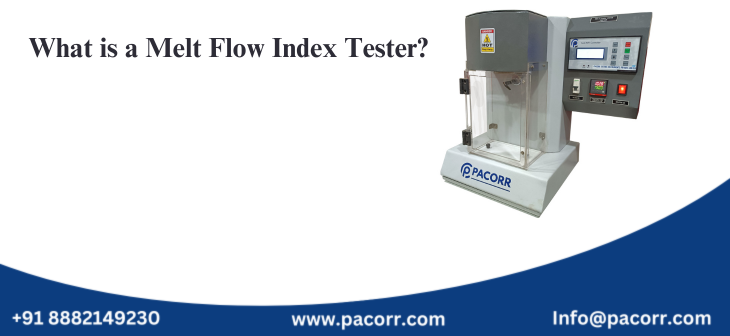
The Melt Flow Index Tester, manufactured by Pacorr, is an essential tool in the plastics and polymer industries. This advanced testing equipment helps measure the melt flow rate (MFR) of thermoplastics, offering critical insights into their viscosity and molecular structure. Known for its precision and reliability, Pacorr’s MFI Tester is a preferred choice for manufacturers aiming to maintain stringent quality standards. Whether used in packaging, automotive, medical devices, or construction materials, this instrument ensures the consistency and processability of polymers, helping industries deliver superior products.
Understanding the Melt Flow Index Tester
The Melt Flow Index Tester operates on a straightforward principle: measuring the rate at which a molten polymer flows through a die under specific temperature and pressure conditions. The test involves the following key steps:
- Sample Preparation: A small amount of the polymer is placed into the testing chamber, preheated to the material’s melting point.
- Controlled Heating: The chamber maintains a consistent temperature to ensure accurate results.
- Extrusion Under Load: A defined weight is applied to the molten polymer, forcing it through a capillary die.
- Flow Measurement: The mass of the extruded material over 10 minutes is weighed and reported as the MFR (in grams/10 minutes).
Key Parameters Measured:
- Viscosity: Determines how easily the polymer flows when melted.
- Molecular Weight: High MFR indicates low molecular weight and vice versa.
- Thermal Stability: A consistent MFR over multiple tests reflects good stability.
These parameters help engineers and scientists optimize material formulations and ensure compatibility with specific manufacturing processes like injection molding and extrusion.
Importance of Melt Flow Index Testing
1. Material Characterization
The MFI Tester provides essential insights into a polymer’s behavior during processing. For instance, materials with high MFR are more suitable for thin-walled products, while low-MFR materials are better for heavy-duty applications.
2. Quality Assurance
Consistency in MFR ensures uniformity in production, minimizing variations that could lead to defects.
3. Cost Efficiency
By understanding a polymer’s flow characteristics, manufacturers can reduce waste, optimize production cycles, and enhance material utilization.
4. Regulatory Compliance
Industries such as medical and automotive require strict adherence to material specifications, and MFI testing ensures compliance with these standards.
Expanded Case Studies
Case Study 1: Advancing Structural Plastics for Construction
A construction company specializing in PVC pipes experienced frequent complaints of cracking during installation in extreme temperatures. Their investigation revealed inconsistencies in the material's thermal properties, which could lead to brittleness in cold environments.
The team introduced a Melt Flow Index Tester into their quality control process to evaluate the MFR of raw PVC materials. By identifying suppliers whose polymers met the ideal MFR range, they ensured better performance under varying climatic conditions. The result was a 60% reduction in pipe failures, boosting the company's reputation and securing long-term contracts with major clients.
Case Study 2: Optimizing Consumer Electronics Manufacturing
A smartphone manufacturer encountered issues with defective plastic casings that failed durability tests. The problem stemmed from the inconsistency in the polycarbonate used, which was either too brittle or too malleable.
Using the MFI Tester, the quality assurance team analyzed various polymer batches to determine the optimal MFR range for their requirements. This testing allowed the company to standardize its material sourcing, resulting in casings with improved shock resistance and a more streamlined assembly process. The initiative reduced defect rates by 50%, contributing to higher customer satisfaction and fewer warranty claims.
Case Study 3: Improving Textile Applications
A leading producer of synthetic fibers for sportswear faced difficulties achieving uniform thread thickness, leading to complaints from downstream garment manufacturers. Upon analysis, the company discovered that the melt spinning process relied on polymers with inconsistent flow properties.
By implementing regular MFI testing, the company was able to refine its material selection and adjust its extrusion settings accordingly. The change led to a 40% improvement in thread consistency, enhancing fabric quality and reducing wastage. This optimization saved the company substantial costs while strengthening its position in the competitive sportswear market.
Case Study 4: Enhancing Plastic Packaging Sustainability
A beverage company transitioning to biodegradable plastics for its bottles struggled to meet performance standards. The new materials often cracked under pressure during transportation or storage, leading to product loss.
The company used the MFI Tester to assess the flow properties of various biodegradable polymer blends. By identifying a blend with an MFR that balanced durability with environmental goals, they successfully launched a sustainable packaging line. This move reduced product losses by 25% and helped the company meet its sustainability targets without compromising functionality.
Case Study 5: Revolutionizing 3D Printing Filament Production
A startup manufacturing filaments for 3D printing encountered challenges in maintaining the dimensional accuracy of their products. Customers reported frequent jamming and uneven extrusion during printing.
MFI testing revealed significant variations in the flow properties of the raw materials used. Armed with this data, the company adjusted its material formulations and production parameters, ensuring consistent flow rates that aligned with 3D printer specifications. This resulted in smoother printing experiences for their customers and positioned the company as a trusted supplier in the 3D printing community.
Case Study 6: Customizing Polymer Additives for Agricultural Equipment
A producer of drip irrigation pipes for agriculture faced issues with wear and tear under UV exposure. The additives used to enhance UV resistance weren’t blending consistently with the base polymer, causing premature failures.
The team employed an MFI Tester to analyze how the additives affected the material’s flow properties. By fine-tuning the concentration of the additives and adjusting processing conditions, they achieved uniform blending and improved pipe durability. This solution extended product lifespan by 30%, saving farmers money and enhancing the company’s reputation in the agricultural sector.
These case studies highlight the versatility of the Melt Flow Index Tester across a wide range of industries. Whether it's improving structural plastics for construction, optimizing electronic components, or enhancing textile and agricultural products, MFI testing plays a pivotal role in ensuring material performance and reliability.
By understanding the melt flow characteristics of polymers, manufacturers can address specific challenges, reduce waste, and deliver products that meet customer expectations and regulatory standards. For researchers and students, studying these real-world applications offers valuable insights into the critical role of material science in modern manufacturing.
Thanks to Pacorr Testing instruments, we have all the required quality testing instruments that have helped us to ensure the best quality delivered to our clients.

Danish
Fair Exports Pvt. Ltd.

